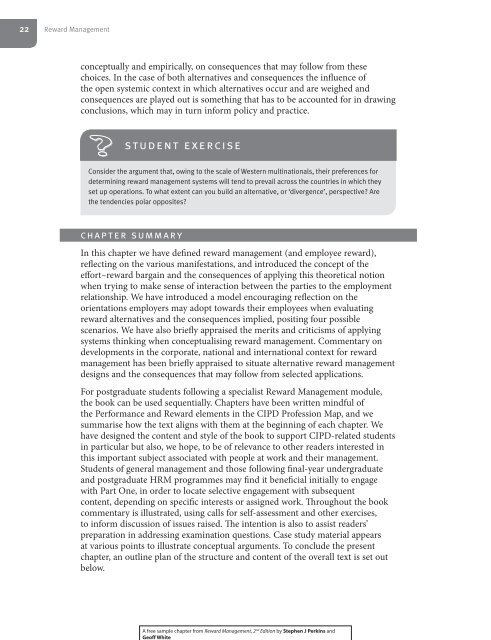Introducing the Reward Management System - CIPD
Introducing the Reward Management System - CIPD
Introducing the Reward Management System - CIPD
You also want an ePaper? Increase the reach of your titles
YUMPU automatically turns print PDFs into web optimized ePapers that Google loves.
22<br />
<strong>Reward</strong> <strong>Management</strong><br />
conceptually and empirically, on consequences that may follow from <strong>the</strong>se<br />
choices. In <strong>the</strong> case of both alternatives and consequences <strong>the</strong> influence of<br />
<strong>the</strong> open systemic context in which alternatives occur and are weighed and<br />
consequences are played out is something that has to be accounted for in drawing<br />
conclusions, which may in turn inform policy and practice.<br />
student exercise<br />
Consider <strong>the</strong> argument that, owing to <strong>the</strong> scale of Western multinationals, <strong>the</strong>ir preferences for<br />
determining reward management systems will tend to prevail across <strong>the</strong> countries in which <strong>the</strong>y<br />
set up operations. To what extent can you build an alternative, or ‘divergence’, perspective? Are<br />
<strong>the</strong> tendencies polar opposites?<br />
chapter summary<br />
In this chapter we have defined reward management (and employee reward),<br />
reflecting on <strong>the</strong> various manifestations, and introduced <strong>the</strong> concept of <strong>the</strong><br />
effort–reward bargain and <strong>the</strong> consequences of applying this <strong>the</strong>oretical notion<br />
when trying to make sense of interaction between <strong>the</strong> parties to <strong>the</strong> employment<br />
relationship. We have introduced a model encouraging reflection on <strong>the</strong><br />
orientations employers may adopt towards <strong>the</strong>ir employees when evaluating<br />
reward alternatives and <strong>the</strong> consequences implied, positing four possible<br />
scenarios. We have also briefly appraised <strong>the</strong> merits and criticisms of applying<br />
systems thinking when conceptualising reward management. Commentary on<br />
developments in <strong>the</strong> corporate, national and international context for reward<br />
management has been briefly appraised to situate alternative reward management<br />
designs and <strong>the</strong> consequences that may follow from selected applications.<br />
For postgraduate students following a specialist <strong>Reward</strong> <strong>Management</strong> module,<br />
<strong>the</strong> book can be used sequentially. Chapters have been written mindful of<br />
<strong>the</strong> Performance and <strong>Reward</strong> elements in <strong>the</strong> <strong>CIPD</strong> Profession Map, and we<br />
summarise how <strong>the</strong> text aligns with <strong>the</strong>m at <strong>the</strong> beginning of each chapter. We<br />
have designed <strong>the</strong> content and style of <strong>the</strong> book to support <strong>CIPD</strong>-related students<br />
in particular but also, we hope, to be of relevance to o<strong>the</strong>r readers interested in<br />
this important subject associated with people at work and <strong>the</strong>ir management.<br />
Students of general management and those following final-year undergraduate<br />
and postgraduate HRM programmes may find it beneficial initially to engage<br />
with Part One, in order to locate selective engagement with subsequent<br />
content, depending on specific interests or assigned work. Throughout <strong>the</strong> book<br />
commentary is illustrated, using calls for self-assessment and o<strong>the</strong>r exercises,<br />
to inform discussion of issues raised. The intention is also to assist readers’<br />
preparation in addressing examination questions. Case study material appears<br />
at various points to illustrate conceptual arguments. To conclude <strong>the</strong> present<br />
chapter, an outline plan of <strong>the</strong> structure and content of <strong>the</strong> overall text is set out<br />
below.<br />
A free sample chapter from <strong>Reward</strong> <strong>Management</strong>, 2 nd Edition by Stephen J Perkins and<br />
Geoff White<br />
Published by <strong>the</strong> <strong>CIPD</strong>.<br />
Copyright © <strong>CIPD</strong> 2011<br />
All rights reserved; no part of this excerpt may be reproduced, stored in a retrieval system,<br />
or transmitted in any form or by any means, electronic, mechanical, photocopying, recording,<br />
or o<strong>the</strong>rwise without <strong>the</strong> prior written permission of <strong>the</strong> Publishers or a licence permitting<br />
restricted copying in <strong>the</strong> United Kingdom issued by <strong>the</strong> Copyright Licensing Agency.<br />
If you would like to purchase this book please visit www.cipd.co.uk/bookstore.

















